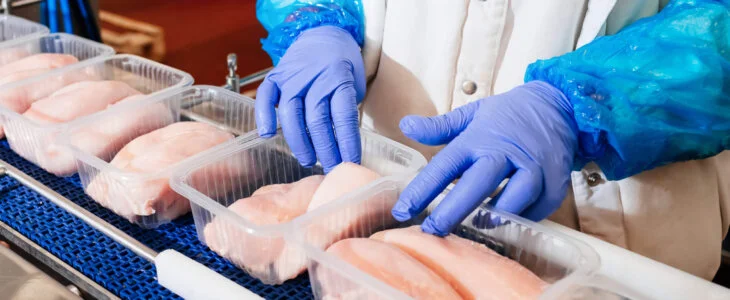Nearly 10 million pounds of ready-to-eat chicken and meat products were recalled due to possible Listeria contamination. This recall impacts products from BrucePac, a major supplier that distributes to big retailers like Costco, Target, and Trader Joe’s. The sheer volume of recalled products, coupled with the risk of listeria infection, has made this a major food safety concern nationwide.
As consumers rush to check their freezers for affected items, the incident also brings attention to the legal implications of such large-scale recalls. Deldar is here to talk about the chicken recall and provide useful information to consumers. If you or a loved one has been affected by this contamination, understanding your legal rights in cases of foodborne illness is critical.
Chicken Recall Details
The U.S. Department of Agriculture (USDA) identifies BrucePac, an Oklahoma-based company, as the source of the contaminated chicken products. Over 9.9 million pounds of meat and poultry have been recalled, and these products were distributed across major retailers. The contamination was first discovered during routine product testing by the USDA, which found traces of Listeria in BrucePac’s ready-to-eat chicken products. Some of the items include:
- El Monterey Mexican Grill Chicken and Cheese Taquitos
- Trader Joe’s Chicken Chow Mein
- Good and Gather Chicken Tikka Masala
These products have specific lot codes and best-by dates, and consumers are urged to check the full recall list on the USDA’s website. The recall has not yet resulted in any reported illnesses. Authorities advise consumers to discard or return the contaminated items. Individuals experiencing foodborne illness symptoms should call their doctor and receive medical treatment as needed.
What Is Listeria?
Listeria monocytogenes is a bacterium that causes listeriosis, a serious infection typically contracted from eating contaminated food. It can affect people of all ages but is particularly dangerous for pregnant women, newborns, older adults, and individuals with weakened immune systems. According to the Centers for Disease Control and Prevention (CDC), symptoms of listeriosis can include fever, muscle aches, headaches, stiff neck, confusion, and even seizures. The bacteria can also lead to gastrointestinal symptoms like nausea and diarrhea. In severe cases, listeriosis can cause miscarriages, stillbirths, seizures or even death in vulnerable individuals.
To understand more about this infection and how to protect yourself, the World Health Organization (WHO) stresses the importance of food safety practices such as proper cooking and refrigeration. Since Listeria can grow in colder environments, it poses a higher risk in ready-to-eat products like those involved in this recall. In general, the WHO recommends five safe practices for handing food:
- Keep food clean
- Separate raw & cooked food
- Cook food thoroughly
- Keep food at safe temperatures
- Use safe water & raw materials
In a company press release, BrucePac says, “Because we sell to other companies who resell, repackage, or use our products as ingredients in other foods, we do not have a list of retail products that contain our recalled items.” Consumers should visit the USDA’s website or call the retailer or company on the packaging to identify recalled products.
Foodborne Illness & Product Liability
The widespread nature of this recall highlights the potential for product liability claims. Under U.S. law, manufacturers, distributors, and retailers are responsible for ensuring that the food they sell is safe for consumption. When a product causes illness or injury, those affected may have grounds to file a product liability lawsuit.
In the case of foodborne illness, such as the current chicken recall due to listeria contamination, plaintiffs can argue that the product was defective and dangerous when sold. The USDA’s report on product liability explains that food companies may be held accountable under strict liability laws. Victims do not have to prove negligence—only that the food was contaminated and caused harm. This type of legal action can be particularly important in large-scale recalls. In this chicken recall, thousands, if not millions, of consumers could be affected.
Deldar Difference
If you believe you’ve been affected by the recent chicken recall, you may have a valid product liability claim. At Deldar Injury & Trial Attorneys, we specialize in helping victims of foodborne illness seek justice and compensation for their injuries. With our knowledge of product liability law, we can assist you. Everyone needs to understand their rights and what steps to take in the legal process.
The recent USDA chicken recall reminds us that items we buy daily at the grocery store can be dangerous. With millions of pounds of potentially contaminated products reaching major retailers, it is crucial for consumers to stay informed and take action. For more information on product liability law and how it applies to foodborne illness cases, visit our website or contact us at (844) 335-3271. We are committed to helping our clients get the compensation they deserve!


